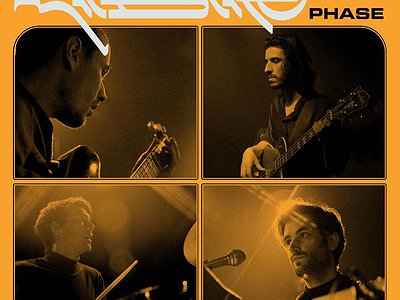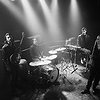Could you take us through a day in your life, from a possible morning routine through to your work? Do you have a fixed schedule? How do music and other aspects of your life feedback into each other - do you separate them or instead try to make them blend seamlessly?
We all have fairly busy lives and Mildlife takes up a part of that for each of us, so we don’t have a daily routine.
Could you describe your creative process on the basis of a piece or album that's particularly dear to you, please? Where did the ideas come from, how were they transformed in your mind, what did you start with and how do you refine these beginnings into the finished work of art?
Our upcoming release Phase had a varied creative process as it was written over the course of a few years. As mentioned above, the ideas mostly came from playing in a room together. The rhythm section of each track was recorded live, vocals and synths were overdubbed. A lot of time was spent recording and re-recording synth parts with different sounds or synths to get them to a point I was happy with.
There are many descriptions of the ideal state of mind for being creative. What is it like for you? What supports this ideal state of mind and what are distractions? Are there strategies to enter into this state more easily?
We recently spent a full week recording an album. Our best work was done first thing in the morning. It’s when we were all alert and had the most energy. I couldn’t say we’ve discovered any strategies other than avoid being tired. Maybe if it’s not working think of something else to do that’s productive. Some days ideas flow out other days they don’t.
How is playing live and writing music in the studio connected? What do you achieve and draw from each experience personally? How do you see the relationship between improvisation and composition in this regard?
For Mildlife most of our music begins in the live context, that is, playing in a room together. The music usually has to work in that context for it to become a song. Nearly all our composing is done in the form of improvisation. Songs are then tidied up in a studio, in the form of adding extra parts or some arrangement adjustments.
How do you see the relationship between the 'sound' aspects of music and the 'composition' aspects? How do you work with sound and timbre to meet certain production ideas and in which way can certain sounds already take on compositional qualities?
Timbre is very important to our songs. We spend a lot of time exploring different synths, drums, guitars & basses to suit a song. Often a synth patch or guitar sound can be the foundation of a song. We always try and have a timbral hook in each song as well as a melodic or harmonic one.
Our sense of hearing shares intriguing connections to other senses. From your experience, what are some of the most inspiring overlaps between different senses - and what do they tell us about the way our senses work? What happens to sound at its outermost borders?
I personally don’t find much crossover in my senses, so it’s hard for me to talk about that. There are plenty of metaphors for colour, taste, texture & smell but they’re all super subjective and don’t really interest me.
Art can be a purpose in its own right, but it can also directly feed back into everyday life, take on a social and political role and lead to more engagement. Can you describe your approach to art and being an artist?
It can be all of those things. For Mildlife we just want to create music that we would like to hear and enjoy playing. We try to make it culturally relevant. That might sound modest and corny, but it really is as simple as that.
It is remarkable, in a way, that we have arrived in the 21st century with the basic concept of music still intact. Do you have a vision of music, an idea of what music could be beyond its current form?
One of my lecturers at Uni said that music hit its theoretical peak in the 1950s, around the time of 4’33”, since then it’s just been re-contextualizing the same elements via instrumentation & arrangement. I think this is pretty much true. It’s basically style and context that change.
People will create the music they want to hear for the place they will listen to it using the technology available. It’s hard to say what that will look like, but I think it will be fairly recognisable.



